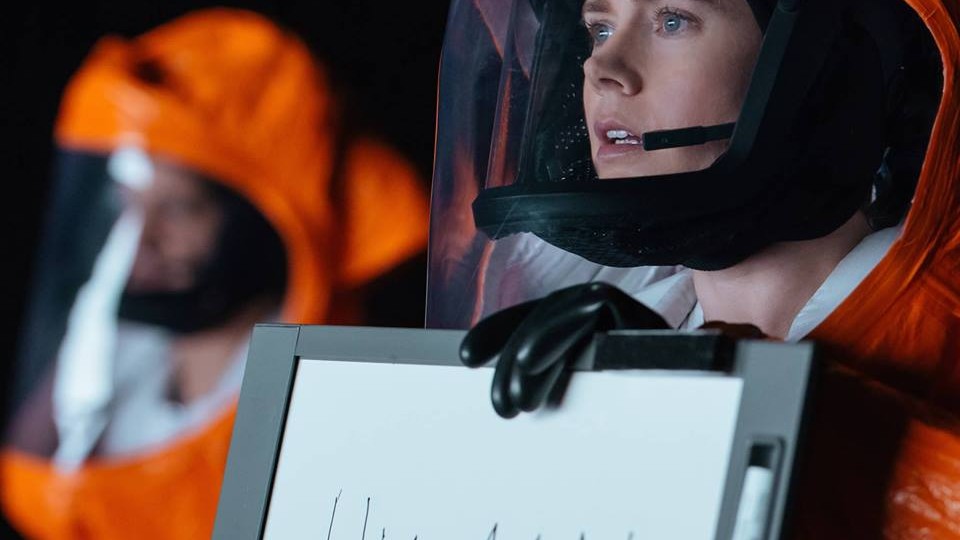With such searingly-laced dramas as 2013’s Prisoners and in last year’s more-blistering still cartel-drama Sicario, director Denis Villeneuve once again proves he is second to none in being able to craft an affecting human drama set in a consumingly dangerous world – and proves it here on his largest scale to date.
Inevitably, alien invasion movies must ask themselves – and their audience – the same critical question: What are they doing here? And yet, before this question can even be poised to alien life forms, the small hurdle of needing to teach word-based human language to an alien species of entirely symbol-based communication for which to even understand what a “question” is, must be developed. Good thing the world would have time for such a laborious undertaking and wouldn’t likely be on the brink of planet-wide war.
This is the premise of Arrival, a multi-layered sci-fi movie that hinges its dramatics on a linguist’s attempt to find a way to communicate with aliens amidst a ticking-time-bomb that is a Cold War standoff between international nations and extraterrestrials. Add to this a circular, non-linear time-space narrative that marries the unlocking of alien language to alternate realities, and Arrival stands as the smartest sci-fi offering of the year.
When twelve unidentified flying objects land – or more so, ominously hover – over the world, linguistics professor Dr. Louise Banks (Amy Adams) is called upon by Colonel Weber (Forest Whitaker) to aid the US military in figuring out how to communicate with Earth’s newest visitors and uprooted from her rudimentary undergraduate teaching career. Seen to not be leaving any family behind, Louise gets choppered to the Montana landing site, where she meets another civilian-turned-top-security-cleared-specialist in physicist Ian Donnelly (Jeremy Renner). Yet as quickly as she is absorbed into this new world and its high-stakes stresses, so too do lapses of grief flare up, tied to memories of both her lost child and failed marriage, which the movie opens with in somber flashback, seeing the fleeting glimpses of a child’s birth, through childhood, through ultimately being taken by disease at her side – leaving a now alone Louise to shuffle blindly into a new reality before cutting to present-day invasion.
Downloaded on their missions, Louise and Ian are shuttled up into the alien pod’s entry doors when they open every eighteen hours, floating through the gravity-less pod to get to the chamber to communicate with the life forms inside. After a few unsuccessful trials, initial anxieties and fears subside and Louise is drawn closer to the aliens, eventually stripping away her oxygen suit to convey who her “self” is, leading to more breakthroughs in communication. Yet the closer she comes into proximity and contact with the aliens, more vivid do the fragmented memories of her daughter become, bringing Ian closer to support Louise and her lengthy teaching process which, let’s not forget, runs counter to the timelines of both Colonel Weber and the world. Without giving much else away, Louise and Ian’s relationship develops into what leads to the movie’s largest idea of non-linear realities.
With such searingly-laced dramas as 2013’s Prisoners and in last year’s more-blistering still cartel-drama Sicario, director Denis Villeneuve once again proves he is second to none in being able to craft an affecting human drama set in a consumingly dangerous world – and proves it here on his largest scale to date. In Arrival, Villeneuve deafens the galactic-absurdity of alien life (yet still taps into fantastic imagery of the design of the aliens and their symbol based communication system) to ultimately show the resounding human drama underneath. Whether it be the intimate devastation of a mother who must manage the memory of a deceased child on one end to the conflict of worldwide human civilization needing to work together amidst a fractured modern landscape of language and politics before world war ensues, Villeneuve handles an entire range of drama to polished success.
Arrival, like Villeneuve’s filmography, is pristinely photographed and operates in chillingly measured pace, and it’s great fun to see the director maintain his human-drama talents while dipping his toes into the world of sci-fi – which, in its final act, ups the entire ante by unveiling the full stakes of the quantum time-leaping canvas: that unlocking the alien’s language may lead to the discovery of alternate timelines that only Louise may be capable of unlocking to save humanity. If at that point, this reality-bending closer feels a bit rushed in having to wrap up all of the movie’s loose ends, and where MacGuffins start to come sailing in like meteor showers, Arrival is still an expertly crafted film that lifts the sci-fi genre to even greater, more thoroughly constructed heights.
116 minutes. “Arrival” is rated PG-13 for brief strong language. In theaters this Friday.
Ryan Rojas
Ryan is the editorial manager of Cinemacy, which he co-runs with his older sister, Morgan. Ryan is a member of the Hollywood Critics Association. Ryan's favorite films include 2001: A Space Odyssey, The Social Network, and The Master.


